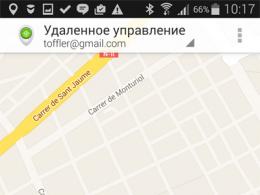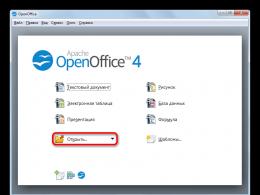What is roaming? What is roaming and what is it used for? What does roaming mean.
The term " roaming" comes from the English word roam - "wander, roam". For the first time, the concept began to be used with the advent of the global GSM mobile communication system used for cell phones.
The association with wandering or vagrancy is due to the fact that through roaming you can virtually travel around the world and communicate with other users anywhere, wherever they are. In some cases, the term is used in relation to CDMA technology, which provides code distribution multiple access.
Roaming is a service that provides the ability to use a mobile phone abroad without changing the SIM card and mobile operator. Thus, while a person is in the territory of another country, he uses the services of local operators, with whom the roaming agreement of his operator was previously signed.
If your phone supports automatic roaming, you won't need to contact your carrier for help. Your number will be automatically registered in a special guest network. As a rule, the phone itself chooses the operator whose coverage is better. However, in manual mode, you yourself select any available signal.
Roaming is divided into:
- intranet - works in the regions of the country in which there is a network of a "home" operator;
- national - works in regions of the country where there is no "home" operator network, but there are partnership agreements with other local telecom operators;
- international - works in countries where the "home" operator has partnership agreements with local telecom operators.
The most trouble-free roaming is provided by the GSM standard. That is why America and Asia are now switching to it. GSM is the International Standards Association, which includes all operators operating in this format. Initially, GSM was used as a global mobile service for Scandinavia, then spread across Europe and the world.
To use roaming, you need to activate the service on your phone. Some mobile operators provide subscribers with already activated tariffs, so for calls abroad it is enough to have a certain amount on the account (usually in the amount of the cost of a minute of conversation or 1 SMS message).
If the service is not open, it is enough to contact the Customer Service Center of your operator or activate access to roaming by pressing a certain key combination (each mobile company has its own one).
Why is roaming expensive?

Expensive roaming is a "feature" of Russia. In the countries of the European Union, for example, its price is constantly decreasing. The European Parliament even approved a directive that sets the maximum allowable cost per minute of conversation. In addition, there are constant debates about the complete abolition of additional tariffication of communications outside a particular country. In Russia, prices are only increasing. And okay, if you had to pay for roaming only while abroad, but the "feudal fragmentation" of mobile operators makes you pay 2-3 times more even in neighboring areas.
The high cost of the service is justified by the cost component. The operator needs to pay for the transfer of telephone traffic from the home network to the guest network, as well as pay the tariffs of the host that serves the subscriber. Therefore, a person needs to pay not only for outgoing calls, but also for incoming ones.
The price of outgoing calls is formed by the operator, which provides its network for roaming services. It is quite logical that this price approximately coincides with the price of international communication in its standard tariff plans. It just can't be too small. The charge for incoming calls is the responsibility of the "home" operator, so it could theoretically be small, but operators rarely give people such happiness. Using the Internet in roaming is not recommended in principle, it is better to look for Wi-Fi.
Roaming tariffs of the "big three"
Consider the standard tariff plans of the "big three" Russian operators: MTS, Beeline and Megafon. Comparing prices for outgoing calls in international roaming, we took the option of calls to Russia, and not to the host country.

"MTS" - the cost within the country may vary, depending on the city and tariff, but on average you will have to pay 8.9 rubles. per minute for both outgoing and incoming calls, as well as 3.95 rubles. for outgoing SMS (incoming will be free).
As for foreign countries, here we need to look at a specific direction.
- USA: 200 R/m incoming and outgoing calls; 19 rub. outgoing SMS;
- Belarus: 85 r/m incoming and outgoing calls; 19 rub. outgoing SMS;
- China: 115 r/m incoming and outgoing calls; 19 rub. outgoing sms.

"Beeline" - within the country, in most tariff packages, the cost is from 2.5 to 9.95 rubles per minute (both incoming and outgoing). SMS will cost 3.95 rubles.
As for the three foreign countries, we have the following picture:
- USA: 69 r / m incoming and 129 rubles / min. outgoing calls; 19 rub. outgoing SMS;
- Belarus: 49 R/M incoming and 129 RUR/min. outgoing calls; 19 rub. outgoing SMS;
- China: 69 r / m incoming and 129 rubles / min. outgoing calls; 19 rub. outgoing sms.

"Megaphone" - roaming within the country costs 9 r / m for calls, and 3.9 rubles. for a text message.
International roaming:
- USA: 79 r/m incoming and outgoing calls; 19 rub. outgoing SMS;
- Belarus: 49 r/m incoming and outgoing calls; 19 rub. outgoing SMS;
- China: 79 r/m incoming and outgoing calls; 19 rub. outgoing sms.
It is worth noting that all operators have special promotions that allow you to save. However, even with them, communication can hardly be called cheap.
The advantage of roaming over tourist sim cards
When going abroad and taking a mobile phone connected to roaming with you, you:
- keep in touch with family and colleagues on a familiar phone - in case something emergency happens or you just want to chat. Moreover, the call will cost your loved ones the same amount as if you had not left anywhere. Roaming guarantees stable high-quality communication at understandable and familiar rates;
- you can count on "native" technical support in Russian, and account replenishment will take place as usual.
All this is said in contrast to tourist sim-cards or cards of local operators. Choosing the second option, you are forced to notify everyone about your temporary phone number. In case of any problems, you will seek help in the language of the country where you are resting. Finally, in some countries, replenishment of the account is taxed: for example, in Turkey, this tax is 32%. In Egypt - 15%.
Another important advantage in using a "native" phone is indisputable for those who are engaged in extreme travel. In the event of some kind of natural disaster or accident, the traveler will be able to be detected by a phone signal and rescued.

Figures and facts:
The most popular roaming regions for Russia:
- Ukraine, CIS, Kazakhstan;
- Popular beach destinations: Turkey, Egypt;
- Business directions in Europe: France, Great Britain, Germany, Italy.
Approximately 10% of subscribers use intranet roaming in Russia. In the summer months, 50% of roaming falls on the CIS countries.
The first roaming agreement in Europe was signed in 1992 between Telecom Finland and Vodafone UK.
In Russia, the first roaming agreement was signed in 1995 with one of the Finnish operators.
Worldwide roaming works in just over 200 countries.
Now over 100 thousand roaming agreements are in effect all over the world.
For maximum coverage of the entire globe, one telecom operator needs about 300-350 partners.
In the early years of roaming, one minute of conversation cost about $20. Over the next 15 years, the price fell by about 40 times.
The Russian company "Beeline" is the only Russian operator that is among the top three world leaders in terms of the number of roaming agreements concluded.
By the way, to use a familiar number in Japan, you need a three-standard phone, which you can rent in Japan upon arrival.
Roaming is a mobile communication service provided to a subscriber by an operator outside the "home" network.
Roaming is divided into:
- intranet - works in the regions of the country in which there is a network of a "home" operator;
- national - works in regions of the country where there is no "home" operator network, but there are partnership agreements with other local telecom operators;
- international - works in countries where the "home" operator has partnership agreements with local telecom operators.
The most trouble-free roaming is provided by the GSM standard. That is why America and Asia are now switching to it. GSM is the International Standards Association, which includes all operators operating in this format. Initially, GSM was used as a global mobile service for Scandinavia, then spread across Europe and the world.
Gradually, all the largest operators came to the conclusion that they divided all roaming zones in the territory and designated a single cost for calls, sms and other services throughout the region. Marketing research shows that it is easier for a user to know the cost and not to think through which operator he keeps in touch, than to remember who has what services and how much, as it was a few years ago. The territorial division of all countries into zones with the same tariff looks like this: About 60 largest liners in the world are equipped with a mobile communication system. Now the possibility of providing mobile communications in aircraft is being discussed - the AeroMobile system (Norway) - flights are being certified. GPRS is already available in most roaming countries. Every year, services such as WAP and MMS are becoming cheaper and more accessible. For a successful call from abroad, three zones are involved: the "home" network, transit networks and the "guest" network. In Russia, Rostelecom is responsible for the signal in transit networks, and Rostelecom, MTT and Golden Telecom are responsible for voice traffic. It is important to understand that there may be several transit nodes, and the failure or poor performance of one of them will affect the quality of the entire call as a whole. For example, you can be completely confident in your "home" operator and connected to a respected and well-known "guest" operator abroad, but the phone numbers of the callers are not determined - most likely one of the transit networks that does not support this function is "to blame". As experts of the Beeline operator say, "the processes of optimal routing are constantly being carried out, but so far it is far from ideal." One single and constant question arises every time we arrive in a foreign country, get off the plane, turn on the mobile phone and it finds the network. Of the three, four or five local operators, the phone chooses this one. Why? The answer is simple. If the phone settings are set to automatic network selection, then the network with the strongest signal is determined first. Moreover, the phone model plays a significant role: two subscribers of the same network with different phone models can catch different networks. And how the caught network is displayed on the screen of a mobile phone depends on the operator’s digital code, which is sewn into the device’s memory (however, there are incidents if the phone model is old and the operator is new). Mutual settlements between telecom operators occur on the basis of TAP-files - electronic encoded files of the GSM standard. Their work is monitored by special clearing houses (there are only a few of them in the world), which ensure the timely receipt and processing of files. Each operator selects one of the clearing houses. At the moment when you make a call or send an SMS, the "guest" operator sends a request to the "home" operator to find out if you have enough funds on your account to perform this operation. If enough - you are connected, if not - they report that this operation is impossible. It is known that the largest Russian operators receive from their foreign partners about 500,000 billing records daily: these records tell the "home" operator about all the operations that their client has performed while in roaming. Mutual settlements and payments between operators occur at the end of the month. Roaming tariff depends, first of all, on the prices of local operators. For example, according to Beeline, a minute of conversation of a subscriber of this network in France costs the company 43.8 rubles, and the subscriber pays 48.3 rubles for it. At the same time, it is no secret that the European Union is now fighting hard with high roaming rates in Europe. European operators make concessions and reduce the cost of intra-European calls, however, in order not to suffer losses, they raise roaming prices for citizens whose phones are registered outside the European Union. For 2006-2007 the rise in prices for international roaming with Europe increased by 20%. For the client, the cost of services depends on the roaming zone. A few years ago, roaming services in each country and each operator cost differently. It is believed that the current situation is more convenient, although the issue is, of course, debatable. Before dividing the world into several tariff zones, the user could choose from which operator to send cheaper sms, from which to receive local calls, and from which to call home. It is important to note that not all services that are free in the "home" network will remain free in roaming. For example, a call to the support service from abroad becomes paid: the "home" network will not take money from you, but the "guest" operator will certainly. However, self-respecting large operators prioritize roaming calls to the support service, which means that a person calling from abroad will be connected to the operator faster than the client who is waiting for an answer in the "home" network. The situation with short numbers is ambiguous. In most foreign networks, it is possible to use short numbers. Moreover, if the short numbers match (for example, both the "home" and "guest" operators use the same set of numbers for some of their services), you are most likely to be sent with this call to the "home" network. The most unpleasant and, at times, the most difficult issue that arises before mobile phone users abroad is information about the balance and the possibility of replenishing the account. The first part of the issue was resolved at the moment when tour operators introduced the ability to find out the balance using a short number. This service works in roaming and is free, so you can check your account status at any time. True, there is one caveat. Within the "home" network, operators provide online billing. This means that the money for a call or any other service is debited from the account immediately. Another thing is roaming. Probably, everyone has come across the fact that at some point in time you are sure that there is money in the account, and then suddenly - once! - and they become much smaller or the number is completely disabled. Even more unpleasant is the situation when a tourist returns home, and after a week or two a huge amount of money is debited from the account. And only a call to the support service or a personal visit to the operator's office allows you to find out that the missing money went to pay the bill of a foreign operator, who only a week later or at the end of the month issued an invoice for the services rendered. The situations described in the previous paragraph happen less and less frequently. To avoid them completely, you need to find out from your operator before the trip which of the "guest" operators provides online billing. Usually, the network that is automatically selected by the phone meets this requirement. Only online billing allows you to monitor the real state of the account. Otherwise, you can go into a negative balance very unexpectedly. Using a phone while roaming is always more expensive than we are used to in everyday life. Even if you don't intend to constantly use your phone during the trip, a couple of unexpected calls can bring the balance to a minus. How to replenish the account if the balance is positive: It is impossible to replenish the account from abroad with a negative balance on your own. It remains for you to either contact your friends back home in some other way (besides a mobile phone) and ask them to deposit money into your account, or wait until one of them guesses to do it. Without your presence, this can be done either in electronic machines on the streets of the city or in the operator's offices.Roaming zones
"Home", transit and "guest" networks
Call information and cost
Account balance
Refill
1
What is Internet roaming? How is it different from regular roaming?
Internet roaming is access to the World Wide Web outside the zone of your “home” network. Access is provided through the resources of the network of the country where you are located. At the same time, you do not enter into new contracts and do not change the phone number. The principle of operation is the same as with mobile roaming, that is, you can not only make calls outside your network, but also use the Internet.
2
What countries does it work in?
Most mobile operators have approximately the same list: Central and Western Europe, USA, Canada, Latin America, China, South Korea, South Africa, Japan, CIS and Baltic countries. Here is a sample list.
3
Expensive, perhaps?
Relatively. Russian operators offer different prices. Favorable conditions, for example, are offered by Beeline under the option "unlimited Internet in roaming". The cost is calculated only on the day of using the Internet in more than 100 countries around the world. Fixed price - 350 rubles per day.
4
The thing is convenient, but if I use the Internet irregularly, why overpay immediately for daily use?
Usually, the fee for such options is debited only if you go online. On days when you do not use the Internet - do not pay anything. In addition, you get the maximum speed for 100 MB of traffic.
5
100 mb? Don't roam...
As practice shows, it is enough for everything basic: social networks, instant messengers, cards and mail. And if you are the owner of a Visa Platinum, Visa Signature or Visa Infinite premium card, activate the AutoPay option from Beeline and use free internet in international roaming for 7, 14 or 28 days.
Alexander Grishin

Roaming is a service that will help you stay connected when traveling to other cities and countries. The service concerns not only voice communication, but also access to the Internet, SMS and MMS messages. Roaming is of two types:
The first kind is international roaming. It is used when the subscriber is in another country. This type of roaming allows you to use your phone and SIM card outside your home country, thanks to the inclusion of operators of another state in the network.

International roaming is activated immediately after you have crossed the state border. In this case, the phone automatically searches for available networks and selects one of them. To be in touch, you must be in the coverage area of the network of a foreign operator.
Please note that the cost of communication services in international roaming is usually very high. Therefore, before the trip, be sure to check the tariffs of your operator for roaming in the planned country of stay.
The second type of roaming is national, also called regional. Its peculiarity lies in the fact that communication can be provided to the subscriber by other operators whose coverage area is present at your place of residence. This type of roaming is, for example,.
In order to use roaming, you need to connect it. You can find out how to do this, as well as get acquainted with the current tariffs, by calling the free reference number of your operator:
- MTS: 0890 from mobile
- Beeline: 8-800-700-06-11 or 0611 from mobile
- Megaphone: 8-800-333-05-00
- Tele2: 611 from mobile
- Iota: 8-800-550-00
If you have questions about roaming and its use, you can leave them in the comments. We will definitely answer.






